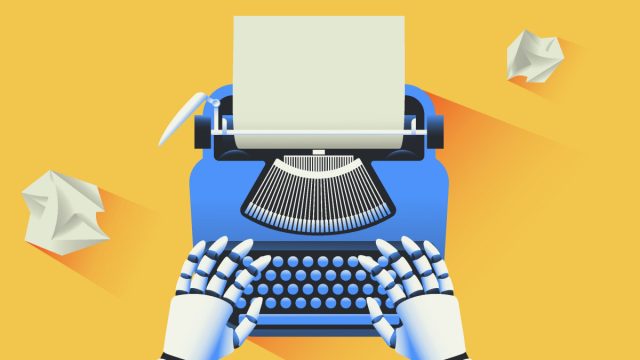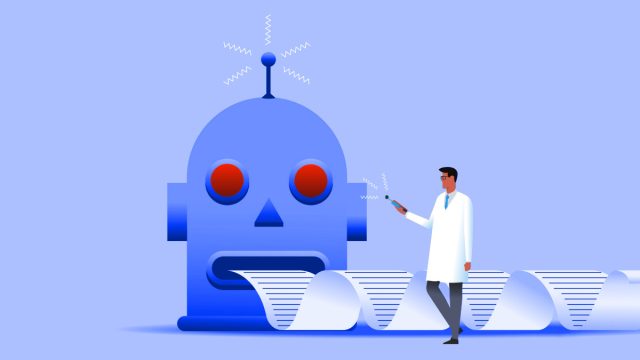
Credit: sturti via Getty Images
Employers are drowning in AI-generated job applications, with LinkedIn now processing 11,000 submissions per minute—a 45 percent surge from last year, according to new data reported by The New York Times.
Due to AI, the traditional hiring process has become overwhelmed with automated noise. It's the résumé equivalent of AI slop—call it "hiring slop," perhaps—that currently haunts social media and the web with sensational pictures and misleading information. The flood of ChatGPT-crafted résumés and bot-submitted applications has created an arms race between job seekers and employers, with both sides deploying increasingly sophisticated AI tools in a bot-versus-bot standoff that is quickly spiraling out of control.
The Times illustrates the scale of the problem with the story of an HR consultant named Katie Tanner, who was so inundated with over 1,200 applications for a single remote role that she had to remove the post entirely and was still sorting through the applications three months later.
In an age where ChatGPT can insert every keyword from a job description into a résumé with a simple prompt, her story is not unique. The problem began shortly after the emergence of mainstream generative AI bots in 2022, when some companies applied the technology to job applications to help overwhelmed job seekers. Now, several years later, the technology has evolved from a convenience tool to a systemic disruption of the hiring process.

Credit: Getty Images
Some candidates are now taking automation even further, paying for AI agents that autonomously find jobs and submit applications on their behalf. Recruiters report that many of the résumés look suspiciously similar, making it more difficult to identify genuinely qualified or interested candidates.
Computer tools have been assisting with creating résumés for decades, and everything from the typewriter to word processors to spellcheck and résumé templates have increased the ease of making a competent résumé. But AI has pushed the trend into overdrive. The potential to create endless output makes AI fundamentally different from its predecessors. Whereas earlier technologies helped people craft one good résumé more efficiently, AI enables candidates to generate hundreds of customized applications with minimal effort—turning what was once a time-intensive process of demonstrating interest into a numbers game that overwhelms businesses trying to find genuinely qualified applicants.
The frustration has reached a point where AI companies themselves are backing away from their own technology during the hiring process. Anthropic recently advised job seekers not to use LLMs on their applications—a striking admission from a company whose business model depends on people using AI for everything else.
The slow, painful death of the résumé
In response to the deluge, companies now deploy their own AI defenses. Chipotle's AI chatbot screening tool, nicknamed Ava Cado, has reportedly reduced hiring time by 75 percent. However, this trend from businesses has led to an arms race of escalating automation, with candidates using AI to generate interview answers while companies deploy AI to detect them—creating what amounts to machines talking to machines while humans get lost in the shuffle.
Ironically, LinkedIn has stepped into the middle of the crisis by providing even more AI, with new tools that aim to help both candidates and recruiters narrow their focus. For example, an AI agent launched late last year can write follow-up messages, conduct screening chats, suggest top applicants, and search for potential hires using natural language on the platform.
Beyond volume, fraud poses an increasing threat. In January, the Justice Department announced indictments in a scheme to place North Korean nationals in remote IT roles at US companies. Research firm Gartner says that fake identity cases are growing rapidly, with the company estimating that by 2028, about 1 in 4 job applicants could be fraudulent. And as we have previously reported, security researchers have also discovered that AI systems can hide invisible text in applications, potentially allowing candidates to game screening systems using prompt injections in ways human reviewers can't detect.

Credit: Moor Studio via Getty Images
And that's not all. Even when AI screening tools work as intended, they exhibit similar biases to human recruiters, preferring white male names on résumés—raising legal concerns about discrimination. The European Union's AI Act already classifies hiring under its high-risk category with stringent restrictions. Although no US federal law specifically addresses AI use in hiring, general anti-discrimination laws still apply.
So perhaps résumés as a meaningful signal of candidate interest and qualification are becoming obsolete. And maybe that's OK. When anyone can generate hundreds of tailored applications with a few prompts, the document that once demonstrated effort and genuine interest in a position has devolved into noise.
Instead, the future of hiring may require abandoning the résumé altogether in favor of methods that AI can't easily replicate—live problem-solving sessions, portfolio reviews, or trial work periods, just to name a few ideas. For now, employers and job seekers remain locked in an escalating technological arms race where machines screen the output of other machines, while the humans they're meant to serve struggle to make authentic connections in an increasingly inauthentic world.
Perhaps the endgame is robots interviewing other robots for jobs performed by robots, while humans sit on the beach drinking daiquiris and playing vintage video games. Well, one can dream.

-
 C114 Communication Network
C114 Communication Network -
 Communication Home
Communication Home


